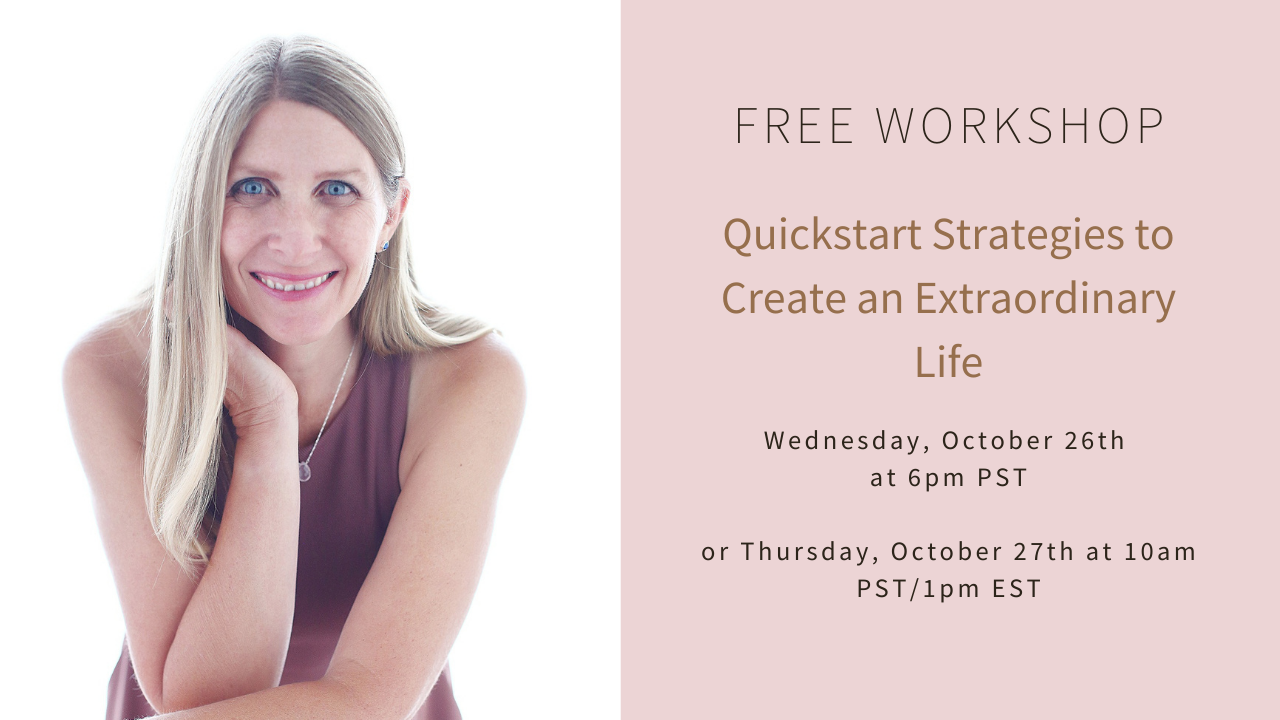Create a Life Roadmap With These 5 Questions

Listen on The Extraordinary Life Podcast
Wouldn’t it be amazing if you could create a life roadmap so you knew exactly where you were going and which forks in the road to follow toward your goals? Since “the great pause” over the past 2 ½ years, I’ve been hearing a lot of “well, what now?” from within my network. It’s hard to feel sure what steps to take next after all the uncertainty, but I have five questions that will help you find clarity. Your answers will also serve as a roadmap, something you can refer to when faced with tough decisions or when you don’t know what to do next.
I encourage you to think about your answers and write them down. There is something about writing that cements the thoughts into your mind, and makes them more tangible. It will also serve as a reference that you can come back to anytime you need.
If you’re ready to jump back into life and achieve your dreams, I’d love to invite you to my FREE workshop coming up: Quickstart Strategies to Create an Extraordinary Life. Over two hours, you’ll learn strategies you can implement immediately to make your dreams happen faster.
Making Choices Doesn’t Need to be Hard
Life throws a lot of choices at us, and making decisions is hard when you don’t have a clear vision of where you want to go. This can lead you to taking the first halfway decent choice that comes along or, even worse, you put the decision off until it is too late and it is made for you. This clearly isn’t the best way to get what you want out of life, yet many of us leave life to chance. The following questions will help you create a life roadmap that will guide you in these moments so you can be confident in the paths you choose or decide to pass by.
Answer These 5 Questions to Create a Life Roadmap
1. What Does Success Mean To You?
The first (and hardest) question to ask yourself is, what does success mean to you? What do you actually want from life? Most people haven’t taken the time to answer this, but it’s essential. How can you get what you want if you only have a vague idea what that “thing” is? When you answer this, specificity is key.
Let’s use money as an example. Saying “I want to be rich” is vague, because richness means different things to different people. You could say “I want a million dollars”, but that still isn’t deep enough. What would the money do for you? Why do you want it? Some better alternatives could be:
- I want to have enough net income to meet my current financial responsibilities without strain, plus have time and money left over for travel.
- I want to be able to comfortably afford a jet-setting lifestyle in New York City.
- I want to be able to spend three days at home each week with my kids.
Once you know why you want “to be rich”, you can then elaborate and begin to define the dollar value.
Since success is not all about money, I encourage you to come up with at least three answers to the question of what success really means to you. After all, things like personal fulfillment, spiritual meaning, connection with others, and other essential needs and values can't be solved, acquired, or even influenced by money.
One of the biggest obstacles to success is that most of us haven't consciously explored what it means to us, aside from some vague idea of material comfort or worldly success. Knowing what success means to you, what you hope or imagine these definitions of success would provide, and how you want those things to physically look in your life allows you to weigh your choices more accurately.
2. What Are Your Non-Negotiable Needs?
This question has you thinking about the things that are necessary for you to live a successful, enjoyable life. When these needs aren’t met, you will find yourself in an environment of stress, want, or disempowerment.
These non-negotiable needs could be things like: Family, travel, no debt, a pleasant work environment, social status, contributions to society, spiritual involvement, public acclaim, love, excitement, comfort, creative expression, friendship, and so on.
When you are clear on your needs, it becomes easier to align your decisions with what really matters to you.
3. What Are Your Non-Negotiable Boundaries?
This question is the flip-side of the previous one. What are all the things you absolutely don’t want in your life? This could be anything! If the idea of working in a standard hierarchical office environment makes you sick to your stomach, write that down. If you can't stand the thought of living in a cold climate, add that to the list. Maybe you have boundaries about the types of people you surround yourself with, the time you spend on hobbies, or how often you work.
By knowing what you won't tolerate, many choices become easier to make. Plus, it allows you to set down a set of rules or policies about who and what you will invite into your life and the standards of behavior you will and won't tolerate. You can even take this a step further and make a list of things you're tolerating now so you can start taking action to remove them from your life.
4. What Are Your Key Values?
At the beginning of all my coaching programs, I do an exercise to identify your most important values. These values identify the type of person you want to be so you can live the life you want to live. Brené Brown has a great list of values to get you started.
Are you a person who values honesty, clean green living, and a deep love of nature above all things? Or are you more of a comfort of home, family, and fun kind of person? Do you value charity over letting others find their way on their own, or is it the other way around? Knowing what you truly stand for is a vital component of good decision making.
5. What Do You Want To Be Remembered For?
Think about what legacy you want to leave when you pass from this life? What would you want people to say about your life and you as a person? What do you want to be known for? If this seems too morbid, you can move the question into the now; in my coaching session on clarity, we identify how we want others to see us.
For example, if you were to hear a couple of friends talking about you in the next aisle of the grocery store, what would you want them to be saying? Knowing the kind of person you want to be or where you want to end up makes choosing the path to get there much easier.
Revisit Your Roadmap Often
This is important reflective work to do, and not just once. Your answers will likely change throughout your life as you gain experience and your priorities shift. My answers as a college student would be different than when I was a new mom, and again different in this stage of my life.
These answers will serve as your compass, guiding you in the direction you need to go to get exactly what you want out of life. Even better, they’ll help you avoid getting to the end of a life lived by default, where you wonder what happened.
Seeking clarity is the first and most important of the High Performance Habits I coach through. If you'd like to learn more, sign up for a free consultation or one of my upcoming workshops for an introduction to High Performance Coaching. I have 1:1 spots available and a new cohort of my Group Coaching Program is coming soon.
Stay connected with news and updates!
Join my mailing list to receive the latest news and updates and get my new Good Morning, Good Night Ritual Guide.
Don't worry, your information will not be shared.


